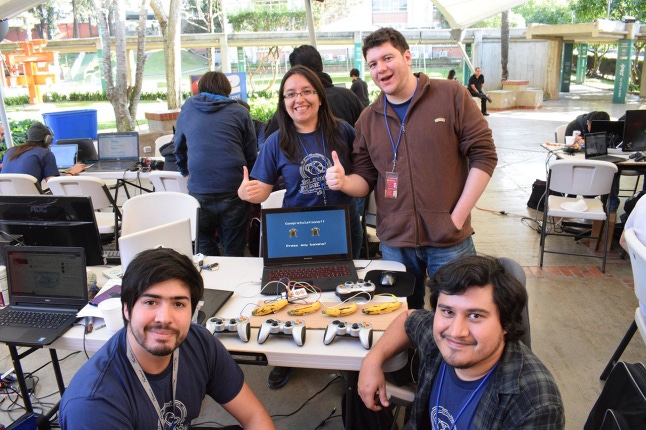
Featured Blog | This community-written post highlights the best of what the game industry has to offer. Read more like it on the Game Developer Blogs.
What it is like being a game dev in Guatemala?

Making games is hard. It doesn't matter if you are an indie or a AAA developer, game development is not easy. And I believe it can be made even more challenging by living in an underdeveloped country, as I do in Guatemala.
The economy of Guatemala is the largest in Central America; however, Guatemala is a country with one of the most unequal distributions of income, as almost half of the population lives under the poverty line. Of course, if people are struggling with poverty, the dreams of making art, science, technology, or video games get truncated.
Guatemala's local game dev scene has been in development for several years, with multiple attempts to establish companies and short-lived efforts by different organizations to support developers. However, at the moment, we seem to be in a difficult-to-escape, vicious cycle that hinders us from thriving in the global game development industry because of the different limitations we've had in the past. I will explain these limitations as follows, giving my perspective of what it is like being a game dev in Guatemala.
First of all, there are no AAA studios in Guatemala, so people cannot apply for jobs in this area. Migrating to other countries is also not that easy because of visa restrictions. A few talented people have been fortunate to study and work abroad but unfortunately is not that easy or accessible to everyone.
The pandemic has opened opportunities to work remotely, and Guatemala offers competitive prices because the cost of living here is low. However, because of the previous lack of opportunities, the majority of talent here is not experienced enough to compete in the global industry. We simply cannot be measured with the same yardsticks if we haven't had the same opportunities.
Indie studios rise and fall in Guatemala, struggling to find a way to sustain themselves. There are a few startups at the moment, but not really any established companies. We believe Guatemala has taken some steps forward in the quality and quantity of game devs. Still, the quality bar of commercial indie games has risen so much that we quickly lose the advantage that we gained.
Indie developers also face hardships as access to funding opportunities. Language barriers. Lack of experience. No contacts with the global gaming industry. Government support is nonexistent, and some of us don't even trust the government because of the long history of corruption. And, of course, there are higher priority issues the government needs to deal with.
In other more industrialized countries, you can attend different conferences and expos and learn and network with peers several times a year. Here, until we started making our own events, there was none of that.
So if it's so difficult, why do we keep trying? Because we love games so much and we believe everyone should have a chance to make them.
By our initiative, we've created our own game development community, GameDevGT, which has now been active for almost eight years. It has been one of the very few organizations that have created events and opened spaces for game developers. We organize game jams, talks, game showcases and have weekly virtual meetings on our Discord server. It may seem that the achievements in those years have been very few, but slowly and steadily, we've been growing and gaining traction.

Our contact network has been growing. Some of us have been able to go to GDC, thanks to scholarships like GGJ and the Train Jam in the past. In 2021 some of us had the support of the IGDA Foundation, Friendship Garden, Xsolla, and the Latin American Video Games Federation. I was granted the opportunity to speak at the #1ReasonToBe panel at GDC 2021 and was selected as part of the Future Class 2021 by The Game Awards.
All these opportunities will help us tremendously in the future. However, there's a long way to go to expand the games industry in Guatemala. Here are some things that would be of great benefit to helping the industry grow and eventually thrive here:
Access to funding opportunities. Some of those funding opportunities may be for games that will not sell well. We need financing for projects that allow people to learn and gain the abilities that will enable them to make sustainable games in the future.
Training. For the talent that is staggered and needs a push to get forward and be able to compete in the global industry. Paid internship opportunities will work great, as sometimes people need to sustain themselves as they learn.
Scholarships, mentorships, and access to a broader contact network.
Support for the released and upcoming games.
Grants for hardware and software licenses
In our studio, Selva Interactive, we've been fortunate to get funding support and mentorship from WINGS. As a result, we've been able to work full-time on our game Illuminaria for more than a year. And we're happy to have a demo ready on Steam that you can try right now. In addition, we're grateful to organizations like Latinx in Gaming and events like Latinx Games Festival and Demospree that gave us space to showcase our game. But it's been difficult for us to find spaces and collaborate with people that do not know us.
We hope Illuminaria can do well so we can continue making games and volunteering in our community. Feel free to contact me if you want to know more about what we do. And if you're Guatemalan, please join GameDevGT. We need more volunteers and leaders, so our community can grow.
If you want to learn more about the games being made by Guatemalans you can check out:

Read more about:
Featured BlogsAbout the Author(s)
You May Also Like









